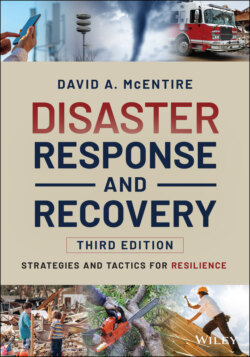Читать книгу Disaster Response and Recovery - David A. McEntire - Страница 108
2.3.3 Community Groups
ОглавлениеCountless community groups are similarly involved in disasters and provide relief to those who have been negatively impacted (Robinson and Murphy 2014; Brennan 2005). Such entities include the United Way, the Rotary Club, Goodwill Industries, and Boy and Girl Scout chapters, among others. Even Antifa (a left‐leaning antifascist and sometimes violent political organization) has been involved relief activities. These community and political organizations donate food, water, clothing, and other necessities of life. They share financial resources and construction supplies with disaster victims and communities. In some cases, these groups may provide translation services for those that have questions about relief programs or cannot read instructions regarding relief applications in English. Civic groups also cover medical expenses that result from disasters or provide massage services to first responders. In addition, these organizations attend to the long‐term needs of victims including crisis counseling, physical therapy, transportation and housing. Some groups address the needs of animals that have been adversely affected by disasters. Others may be interested in preserving books in libraries or artwork in museums that may be or has been affected by disasters. Many individuals will participate in organizations such as Americorps (Simpson and Strang 2004). Others will join the Auxiliary Police, the Fire Corp or Medical Reserve Corp. Thus, the involvement of community groups is broad and far‐reaching. While such organizations are certainly helpful in disasters, they may inadvertently complicate response and recovery activities for others (see Chapter 7). For instance, volunteer groups may start the process of rebuilding neighborhoods before new codes can be passed and enforced. But this does not diminish their extensive contributions when disaster victims are in need.
Coordination within and among community groups can be enhanced by the Points of Light. This is a foundation dedicated to the promotion of volunteering. It addresses many problems related to poverty, education, gender equality, health and well‐being, water & sanitation, and hunger. However, it is also actively involved in disaster issues. In addition to the Points of Light foundation, the National Volunteer Organizations Active in Disasters (NVOAD) plays an important role in the success of response and recovery (Egan and Tischler 2010). This organization brings such agencies together to collaborate on the provision of assistance after disasters. National VOAD consists of 110 member organizations across the United States that act according to core principles of cooperation, communication, coordination, and collaboration. Members are led by a board of directors, which oversees conferences, task forces and other disaster functions.
